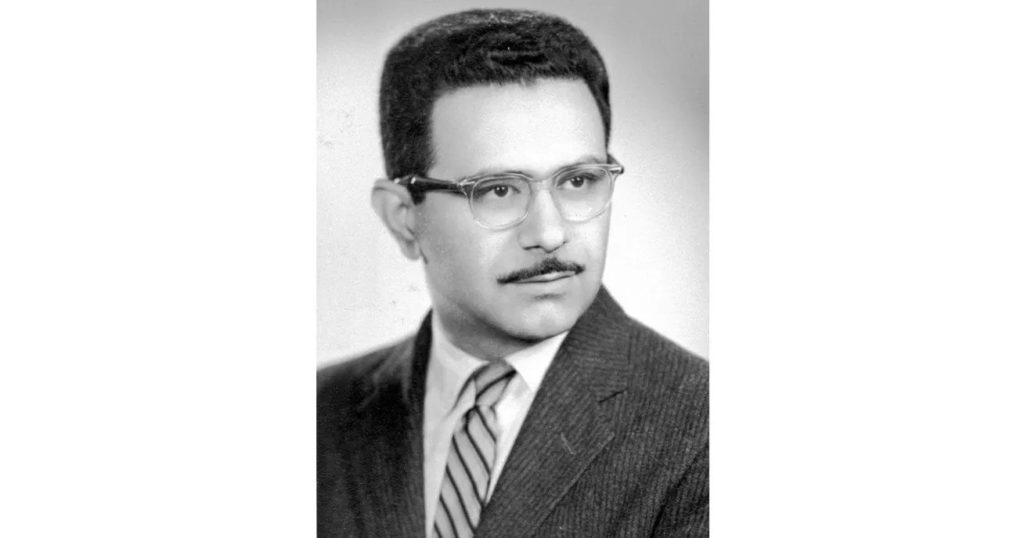Source: iranwire.com
Kian Sabeti

Iranians of all backgrounds have together built Iran, regardless of their personal opinions, religion, or ethnicity. In a series of reports, IranWire looks at prominent personalities from Iran’s ethnic and religious minorities who made major contributions to the country’s progress. If you know of such figures and their services to Iran, you can share it with us by emailing [email protected].
Khosro Mohandesi was born in June 1929 in the city of Kerman. His father, Agha Reza, was a Muslim and his mother, Rouhieh, was a Baha’i. After finishing elementary and secondary school, he went to the teacher training university in Tehran and, in 1951, graduated with distinction in philosophy and pedagogy. He also took a bachelor’s degree in the same fields from Tehran University.
After receiving his bachelor’s degree, Khosro Mohaddessin received a scholarship and went to the United States to continue his studies at the University of Illinois.
In 1954, Khosro Mohandesi completed his master’s degree and doctorate at Illinois with excellent marks and returned to Iran. He began teaching as an assistant professor at the teacher training university and became a professor after a few years.
In 1965, the Faculty of Pedagogy of Tehran University was established to offer courses on teacher training and teaching methodology. Dr. Mohandesi was transferred to this faculty where he worked as a professor. He stayed there until he was fired, years later, for being a Baha’i.
During his academic career, Dr. Mohandesi translated two major texts in his field, Measurement and Assessment in Psychology and Education (1st edition 1964,) and Research Methods in Sociology (1st edition, 1967), both of which were reprinted several times in Persian and were set reading for students at Iranian universities.
Establishing the “Concours” National University Exams
Dr. Mohandesi was also one of the founders and main organizers of Iran’s national university entrance exam system – a system which remains in place today.
Every Iranian university had different ways to assess and admit students, up until the 1960s, using either exams or interviews. Candidates had to repeatedly travel across Iran to participate in the admissions processes of different universities; to solve this, the authorities decided to hold a universal entrance exam, to assess more accurately university candidates. This first nationwide entrance exam for Iranian universities was held by the newly established Board of University Entrance Exam Competitions in 1963. But this early experiment was criticized by the academic community because of the conduct of the exams, and coordination, and universities returned to the old system.
The establishment of an Iranian academic testing center was taken up by the Ministry of Science in 1968 and Dr. Mohandesi was then selected to be one of the first professors on its broad – leading to his foundational role in Iran’s systematized testing regime. The new plan, which he helped design and launch, fixed the flaws of the first version. The new nationwide University Entrance Exam was implemented with the consultation and support of the academic community and its first tests were administered in August 1969 for 703,000 candidates.
Dr. Khosro Mohandesi continued serving as an organizer of the new national University Entrance Exam, and held this position until the 1979 Islamic Revolution, when he was fired from university and government positions due to being a Baha’i.
During his career, Dr. Mohandesi also represented the University of Tehran in international research on infant learning. He was entrusted with the responsibility of creating an international branch for child learning research on behalf of the University of Tehran at the University of Illinois. Khosro Mohandesi was also a member of the International Society of Psychologists and participated in many international academic conferences.
Dr. Mohandesi was a polite scholar and had a certain style in the way he spoke, behaved, and dressed. Order and cleanliness were two of his most important characteristics, noticed even by his fellow prisoners, once he had been arrested and jailed because of his Baha’i beliefs. He was also highly knowledgeable – not only in his own field but beyond. He was also resourceful and a good manager, qualities that served him in his work as an academic and examiner, and which also saw him elected to Baha’i administrative institutions in Tehran.
Baha’i Activities, Arrest and Execution
Dr. Mohandesi was expelled from his university position after the 1979 Revolution. He was elected at this time to the Spiritual Assembly of the Baha’is in Tehran, the city’s elected administrative body for the Baha’i community, responsible for handling the affairs and safeguarding the wellbeing of the Baha’i community in that place.
On 1 November, 1981, agents stormed the meeting of the Spiritual Assembly and arrested six of its members, including Khosro Mohandesi. He and the others were pressured for two months to renounce their beliefs, which they refused to do, and then they were executed by firing squad on January 4, 1982, on the charge of following the Baha’i religion.
Dr. Mohandei was 52 years old when he was executed. He was tried in a closed court without the right to a lawyer. His body was not handed over to his family and was probably buried by agents of the Iranian authorities. According to the Revolutionary Court verdict, his property was confiscated, and his bank account was closed and its assets transferred to the state.
Leave a Reply